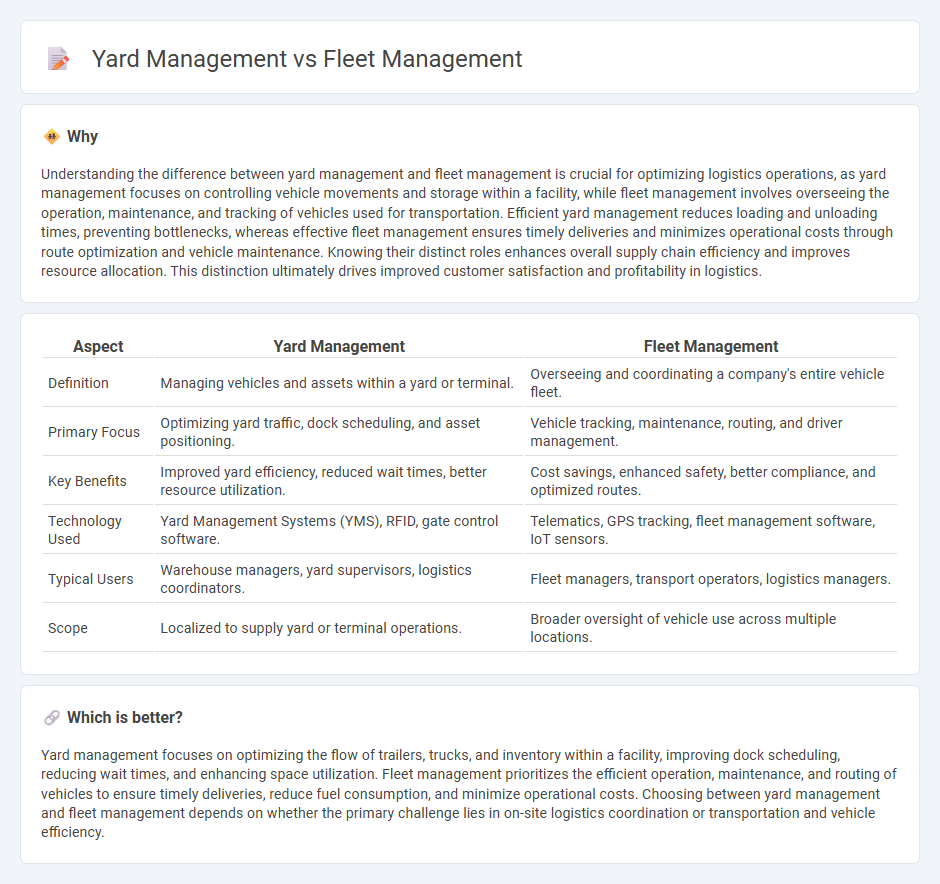
Yard management focuses on optimizing the movement and storage of trailers, containers, and equipment within a warehouse or distribution center yard, ensuring efficient dock scheduling and space utilization. Fleet management involves overseeing the operation, maintenance, and tracking of transportation vehicles to improve routing, fuel efficiency, and driver performance. Explore the key differences and benefits of yard and fleet management to enhance your supply chain operations.
Why it is important
Understanding the difference between yard management and fleet management is crucial for optimizing logistics operations, as yard management focuses on controlling vehicle movements and storage within a facility, while fleet management involves overseeing the operation, maintenance, and tracking of vehicles used for transportation. Efficient yard management reduces loading and unloading times, preventing bottlenecks, whereas effective fleet management ensures timely deliveries and minimizes operational costs through route optimization and vehicle maintenance. Knowing their distinct roles enhances overall supply chain efficiency and improves resource allocation. This distinction ultimately drives improved customer satisfaction and profitability in logistics.
Comparison Table
| Aspect | Yard Management | Fleet Management |
|---|---|---|
| Definition | Managing vehicles and assets within a yard or terminal. | Overseeing and coordinating a company's entire vehicle fleet. |
| Primary Focus | Optimizing yard traffic, dock scheduling, and asset positioning. | Vehicle tracking, maintenance, routing, and driver management. |
| Key Benefits | Improved yard efficiency, reduced wait times, better resource utilization. | Cost savings, enhanced safety, better compliance, and optimized routes. |
| Technology Used | Yard Management Systems (YMS), RFID, gate control software. | Telematics, GPS tracking, fleet management software, IoT sensors. |
| Typical Users | Warehouse managers, yard supervisors, logistics coordinators. | Fleet managers, transport operators, logistics managers. |
| Scope | Localized to supply yard or terminal operations. | Broader oversight of vehicle use across multiple locations. |
Which is better?
Yard management focuses on optimizing the flow of trailers, trucks, and inventory within a facility, improving dock scheduling, reducing wait times, and enhancing space utilization. Fleet management prioritizes the efficient operation, maintenance, and routing of vehicles to ensure timely deliveries, reduce fuel consumption, and minimize operational costs. Choosing between yard management and fleet management depends on whether the primary challenge lies in on-site logistics coordination or transportation and vehicle efficiency.
Connection
Yard management optimizes the organization and movement of trailers within a facility, directly impacting fleet management by reducing truck idle times and improving dispatch efficiency. Effective yard management systems provide real-time data that helps fleet managers streamline routing, scheduling, and driver productivity. This integration enhances overall supply chain visibility, reduces operational costs, and accelerates loading and unloading processes.
Key Terms
**Fleet Management:**
Fleet management involves the coordination, maintenance, and optimization of a company's vehicle fleet to enhance efficiency, reduce costs, and ensure compliance with regulatory standards. Key functions include route planning, real-time tracking, fuel management, driver performance monitoring, and vehicle maintenance scheduling. Discover how integrating advanced telematics and AI-driven analytics can transform your fleet operations and maximize ROI.
Telematics
Fleet management leverages telematics to monitor vehicle locations, driver behavior, and fuel usage in real time, optimizing route efficiency and reducing operational costs. Yard management integrates telematics data to track asset movements within the yard, coordinating loading, unloading, and storage to minimize delays and enhance workflow. Explore how telematics bridges fleet and yard management for seamless logistics solutions.
Route Optimization
Fleet management leverages GPS tracking, telematics, and AI algorithms to enhance route optimization by minimizing fuel consumption and reducing delivery times. Yard management focuses on optimizing vehicle movement within confined spaces, such as loading docks and parking areas, improving turnaround times and reducing congestion. Explore our comprehensive guide to understand how both systems integrate route optimization for maximum operational efficiency.
Source and External Links
What is Fleet Management? - IBM - Fleet management involves overseeing business vehicle fleets including vehicle acquisition, maintenance, driver management, fuel and regulatory compliance, often enhanced by software to optimize operations in real time.
What Is Fleet Management? (A Fleet Managers Guide) - Geotab - Fleet management covers vehicle procurement, fuel efficiency, driver behavior, and operational cost reduction with goals of increasing safety, productivity, compliance, and sustainability.
Fleet management - Wikipedia - Fleet management is the comprehensive management of commercial and work vehicles, including leasing, maintenance, compliance, telematics, safety, and cost efficiency to reduce risks and improve productivity.
 dowidth.com
dowidth.com